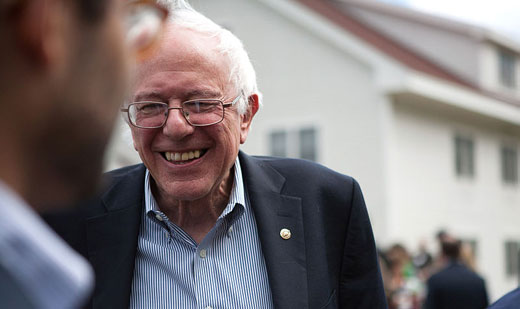
Vermont Senator Bernie Sanders has mounted what is certainly the most significant campaign for president by a socialist since Eugene Debs,who ran from prison in 1920 and received almost one million write-in votes. As someone actively involved in Bernie’s campaign in Ohio, I have several concerns that I fear may derail this historic effort.
Debs actually ran five times as the Socialist Party’s candidate for president, with a platform calling for the end of the capitalist system and its replacement by socialism. Sanders also calls for a “political revolution,” but his program has more limited goals seeking only major reforms of the existing economic system.
Sanders’ clear and powerful speeches presenting this program are resonating with masses of working people, who have thronged his campaign rallies in far greater numbers and enthusiasm than he or anyone else expected, greatly disconcerting national front runner Hillary Clinton. His support is growing and he has overtaken Clinton in the current polls in Iowa and New Hampshire, the first two primary states.
But can this last and is Sanders actually electable? Two serious obstacles stand in his way.
The first is the same problem Debs faced. The United States, despite outrageous inequality and injustice, is not in a revolutionary situation. The voters, however strongly they respond to Sanders, still hope for change within the existing system and are not clamoring for revolution.
The issue before the electorate in 2016 is not whether or not we will have socialism; it’s whether or not we will have democracy. It’s whether working people will have decent living standards and space to fight for needed change. Sanders’ mission as a Democratic candidate is not to defeat the “billionaire class”; it’s to defeat the Republicans, whose party has the support of most, but not all of that class. There are billionaires, like Warren Buffett and George Soros, who are Democrats as well as democrats – bourgeois democrats to be sure – but people who agree with Sanders that “the billionaires can’t have it all.” They believe in a progressive tax reform and the use of this new revenue to create jobs, rebuild the infrastructure, develop renewable energy industries, raise the minimum wage and permit unions to organize. They believe that the preservation of capitalism requires reforms to redistribute the wealth and provide greater economic security for working people. They also have enormous influence in the Democratic Party, the only electoral-legislative vehicle capable of preventing a right-wing extremist takeover of the federal government.
Sanders needs to recognize the lesson, not only of Debs, whose heroic efforts won only a marginal vote in national elections, but also of the more recent experiences of George McGovern in 1972 and Barack Obama in 2008 and 2012. Neither of these latter candidates advocated socialism, but McGovern was a strong progressive and outspoken opponent of the Vietnam war and U.S. Cold War policies generally. Unfortunately, his views were too advanced for the leadership of the Democratic Party which boycotted and sabotaged his election. He got clobbered, winning only Massachusetts and the District of Columbia, and the election wound up delivering the United States and Vietnam to the malicious and corrupt Richard Nixon. Obama, on the other hand, after winning the nomination based on grassroots and progressive forces including labor, the Black community, and young people, recognized he needed the Democratic Party to win the general election and made an alliance with Hillary Clinton, who represented, then as now, the corporate forces in that party. In return for their support they got key Cabinet positions in finance and foreign and military policy.
So Sanders must refine his message to focus on the right-wing extremist section of “the billionaire class.” Otherwise, even if Sanders miraculously wins the nomination, it is not at all clear he could win the election without making similar compromises.
But Sanders also faces a second very serious obstacle. He has little following, name recognition or ties to the African American and Latino communities, and without their active support it is difficult to see how anyone can win the Democratic nomination. Sanders has an excellent voting record with respect to issues of concern to these communities and can boast of some history in the civil rights movement, but whether this is enough to overcome the massive support and extensive ties Clinton has, especially with African Americans, is a serious question and Sanders has shown some ineptitude in this regard.
As he began his campaign in South Carolina where Black voters are the majority of the Democratic primary voters, he chose Dr. Cornel West as his emissary to the Black community. West has antagonized much of the African American leadership by his extreme, reckless and unwarranted criticism of Obama as well as attacking Obama’s defenders like civil rights leader Rev. Al Sharpton who has continually fought against the relentless, racist GOP attacks on the nation’s first African American president. Anyone who thinks they can win over the Black community by associating with attacks on President Obama is extraordinarily out of touch.
Sanders also suffers from the same weakness that has historically afflicted the Socialist Party and was one of the reasons the left wing of that party broke away and formed the Communist Party in 1919. That is, the belief that the racist oppression of Black people is mainly an economic question that will automatically be resolved with economic reforms and socialism. It is this attitude that provoked the hostile reaction by the activists of Black Lives Matter movement
who disrupted Sanders’ speech at the Netroots Nation forum in Phoenix in July.
Sanders has scrambled to address this issue and hired some Black staff, but the problem keeps surfacing and is a major reason his supporters remain overwhelmingly white. In his recent appearance at the New Hampshire Democratic Party convention, Sanders drew large and well deserved applause when he denounced the gender wage gap, but said nothing about the more historic and fundamental racial wage gap, a central aspect of the systemic racism pervading our country. Clinton actually seems to have a better understanding of the central role of the fight against racism in the fight for progress.
Despite his shortcomings that may in the end prove his undoing, Sanders still makes the strongest attack on the fundamental economic injustices confronting working people, and attracts the largest crowds. He is having the biggest effect on moving the electorate to the left, exposing the bankruptcy of the GOP and, additionally, legitimizing the idea of socialism. For these reasons, progressives and socialists should give him wholehearted support even as we keep in mind the main goal is to defeat right-wing extremism in 2016 and must be ready to back whoever wins the Democratic nomination in order to achieve that. That is the task of the moment, the necessary immediate step in moving towards the ultimate political revolution our country needs.
Photo: Bernie Sanders. Wikimedia Commons












Comments